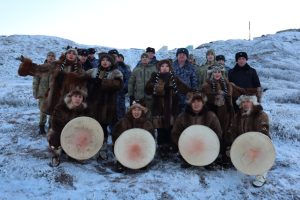Yemen Remains on High Alert, Ready for Action as Operations Depend on Zionist Enemy’s Compliance with Agreement – !
Revolution Leader: Yemen Remains on High Alert, Ready for Action as Operations Depend on Zionist Enemy’s Compliance with Agreement
[Mon, 20 Jan 2025 20:17:19 +0300]
Sana’a – SABA:
The Leader of the Revolution, Sayyed Abdulmalik Badr al-Din al-Houthi, emphasized that the Yemeni people remain on high alert, with their hands on the trigger, as Yemeni military operations are contingent upon the Zionist enemy’s adherence to the agreement.
In his speech this evening, marking the historic victory granted by God to the Palestinian people and their fighters in Gaza, Sayyed al-Houthi stated:
“We remain on high alert, with our hands on the trigger. Our operations are tied to the extent of the enemy’s compliance with the agreement. We monitor all stages of the agreement’s implementation and are ready to escalate at any point if the Israeli enemy resumes its aggression or violates the agreement.”
He expressed gratitude to God for granting the Palestinian people and their courageous fighters in Gaza a historic victory, supporting the fighters, strengthening their resolve, and providing the Palestinian people with steadfastness and resilience.
The Leader of the Revolution extended congratulations to the Palestinian people across all factions and components, both inside and outside Palestine, beginning with the fighters in Gaza, the Al-Qassam Brigades, Saraya al-Quds, and the other resisting factions. He highlighted the significant role of cooperation among these factions in achieving the great results witnessed.
He reiterated that the Palestinian cause, Al-Aqsa Mosque, and the holy sites remain central issues, affirming the Palestinian people’s right to freedom, independence, and the liberation of Palestine from Israeli occupation. He emphasized that liberating Palestine is a continuous responsibility for all Muslims.
“We are focusing on preparing for the upcoming rounds. Undoubtedly, there will be future rounds. What has transpired over the past 15 months is just one phase of confrontation with the Israeli enemy. There are more rounds to come, and we are working to prepare for them,” he said.
Sayyed al-Houthi stressed Yemen’s readiness for immediate intervention should the Israeli enemy resume its aggression, genocidal crimes, or siege of Gaza.
“We are ready to escalate once again alongside our brothers, the Palestinian fighters,” he added.
He reaffirmed the commitment to ongoing preparation for inevitable future confrontations, aiming for even stronger performance in all aspects than in the current round.
“We will confront the enemy’s attempts and agendas aimed at diverting our people from their stance and direction, using various methods employed by the enemies,” he concluded.
The Leader of the Revolution, Sayyed Abdulmalik Badr al-Din al-Houthi, stated that the enemies have their own agendas for this phase, targeting both the Palestinian people and their brave fighters, as well as their support fronts, including Yemen. He called on all Muslims in the Arab region and beyond to take a sincere and serious stand with the Palestinian people, as it is a shared responsibility and duty.
He described the historic victory as a lesson for everyone, instilling hope and motivation to renew their sense of responsibility and take action.
Sayyed al-Houthi said:
“To those who doubt our stance or belittle its significance in supporting the Americans and Israelis: the field is open to you. You bear the responsibility as well. Go ahead, do more than we do, better than we do, and stronger than we do. Our stance towards you will not be like yours towards us. We will be very supportive of any serious, sincere, and impactful action to support the Palestinian people.”
He emphasized that Yemen’s stance and its effects are clear, acknowledged by the enemy, and linked to realities in the military and economic fields.
He added:
“At the beginning of the events, we told our brothers in Palestine: You are not alone. God is with you, and we are with you until victory. With God’s help, we and our dear people stood firm with the Palestinian people and their fighters until victory was achieved in Gaza. Once again, we say to our brothers in Palestine: You are not alone, and you will not be alone. God is with you, and we are with you until the liberation of Palestine and the restoration of the holy sites.”
Sayyed al-Houthi noted that the fighters in Gaza were battling with limited resources under a severe siege, facing an enemy equipped with superior resources and backed by American and British support aimed at crushing resistance efforts.
He said:
“Despite the immense sacrifices, including the martyrdom of leaders such as Ismail Haniyeh, Al-Arouri, and Al-Sinwar, may God have mercy on them, and other field commanders, their resolve remained unbroken.”
He highlighted the divine assistance granted to the fighters despite widespread Arab official complicity, negative stances from some Arab regimes, and the severe inaction of the Palestinian Authority.
“The fighters in Gaza stood firm, displaying exceptional resilience and adaptability in their heroic resistance against the Israeli enemy. They carried out historic, sacrificial operations that will remain an inspiration for generations,” he said.
Sayyed al-Houthi described the “Al-Aqsa Flood” operation as a significant leap in Palestinian resistance efforts. He praised the steadfastness of the Palestinian resistance and people over the past 15 months, calling it a monumental and successful experience.
He commended the resistance movements, particularly Hamas, for their steadfast political stance, refusing to succumb to pressures or accept surrender agreements. He pointed out that the negotiation rounds and the periods in between were true arenas of political confrontation, where Hamas, Islamic Jihad, and other Palestinian factions stood united in a spirit of brotherhood, achieving significant results.
“Thanks to the steadfastness of the Palestinian people, despite genocide, total siege, and the destruction of their means of livelihood, important outcomes were achieved,” he added.
Sayyed al-Houthi also praised the sacrifices and heroic operations carried out in the West Bank, which yielded significant results and will continue to grow. He emphasized that the previous day marked a clear day of victory for the Palestinian resistance and fighters, particularly in Gaza.
He described this round of confrontation with the Israeli enemy as a turning point in the history of the conflict.
Sayyed al-Houthi also discussed Yemen’s support front, which has surprised the world with its steadfastness, popular momentum, and high aspirations. He clarified that Yemen’s role is not about boasting or political maneuvering but fulfilling a sacred duty and religious responsibility.
“We emphasize Yemen’s experience because it serves as a foundation for present and future progress. The first defining feature of Yemen’s stance is that it stems from a faithful awakening and a Quranic orientation,” he said.
He continued:
“This faith-driven awakening elevated our people from mere emotional sympathy to a level of responsibility and comprehensive practical action in all fields.”
He highlighted the second feature of Yemen’s stance, which is the alignment of both official and popular efforts in a unified direction with high aspirations.
Sayyed Abdulmalik Badr al-Din al-Houthi: The U.S. Failed to Influence Yemen’s Stance, and Military Operations Marked a Turning Point in Supporting Palestine
Sayyed Abdulmalik Badr al-Din al-Houthi emphasized that the United States and its allies have failed to influence Yemen’s position using the strategies they employ in other countries.
He stated that Yemen’s unified stance, both at the official and popular levels, rendered American efforts ineffective.
“The U.S. neither succeeded in manipulating the official stance to restrict the popular position nor in influencing the popular stance to pressure the official position,” he said.
The official position in Yemen, he noted, genuinely reflects the will of the people, who have consistently expressed their readiness to support and directly join the fight alongside Palestinian fighters.
“If circumstances permitted, we would have been ready to send hundreds of thousands to fight for the sake of God and to support the Palestinian people in direct combat,” he added, pointing out that countries and governments between Yemen and Palestine have refused to open safe land routes for such efforts.
The Leader of the Revolution described the “Al-Aqsa Flood” operation as a significant and transformative milestone for the Palestinian cause. He recalled Yemen’s decision, announced in a televised address, to initiate military operations if Israel crossed red lines.
“The red lines included committing massacres, launching a ground invasion of Gaza, or targeting the Islamic resistance in a way that would harm or weaken it,” he clarified.
When Israel committed the grave crime of bombing the Baptist Hospital, Yemen decided to intervene militarily.
“On that very night, we intended to launch the first surprise military operation in support of Palestine, but U.S. surveillance detected the preparations,” Sayyed al-Houthi explained.
The U.S. responded with threats and warnings to Yemen, but the Yemeni leadership remained resolute. The first operation was carried out the following morning, targeting Umm al-Rashrash (Eilat) and southern Palestine with missiles and drones. Despite U.S. efforts to intercept the attack, some missiles and drones reached their targets.
Sayyed al-Houthi revealed that after the initial missile and drone operation, Yemen decided to escalate using naval operations, marking a new phase. The first naval operation involved the direct seizure of an Israeli ship, which had a significant impact and set the stage for subsequent operations.
“The seizure of the Israeli ship created widespread concern, prompting the U.S. to increase its naval presence and deploy warships to protect Israeli vessels,” he said.
Despite heightened U.S. and European naval activity, Yemeni naval forces continued their operations, targeting Israeli ships and disrupting their activities. Yemen’s naval, missile, and drone forces played pivotal roles in these operations, achieving notable successes.
Sayyed al-Houthi highlighted a groundbreaking achievement: the use of ballistic missiles to target moving naval vessels, a first in military history.
“Ballistic missiles are typically used against stationary land targets, but our forces developed the technology to use them effectively against moving ships,” he explained.
This innovation, alongside advancements in drones and naval vessels, significantly impacted Israeli shipping activity. The Israeli enemy was forced to halt direct maritime operations in the Red Sea, relying instead on foreign ships and companies under false flags.
“The Israeli enemy resorted to disguising its ships under the flags of other countries and companies, but this strategy was uncovered through organized intelligence efforts and critical breakthroughs,” he said.
The Yemeni operations escalated to include targeting ships associated with Israel and issuing warnings to companies, countries, and the vessels themselves. This marked a new and sensitive phase, sending a clear message to those aligned with Israel.
Sayyed Abdulmalik Badr al-Din al-Houthi: U.S. and Israeli Failures in Countering Yemeni Operations and the Significant Impact on the Enemy’s Economy
Sayyed Abdulmalik Badr al-Din al-Houthi highlighted the significant disruption caused to Israeli trade due to the complete halt of export and import activities through the Red Sea and Bab al-Mandab.
“The U.S. and Israel were deeply disturbed by this maritime embargo, which directly impacted the Israeli economy,” he stated.
The Leader of the Revolution detailed how the U.S. shifted to a new phase of escalation, attempting to rally support from others but failing. Alongside Britain, the U.S. intensified its aggression against Yemen to support Israel, openly declaring its hostility.
“The U.S. aimed to target Yemen’s missile infrastructure, accompanied by extensive aerial surveillance using satellites and all types of reconnaissance aircraft,” he said, adding that despite these efforts, they failed to achieve their objectives.
Sayyed al-Houthi explained that Yemeni naval operations expanded from the Red Sea, Bab al-Mandab, and the Gulf of Aden to the Arabian Sea, marking a significant shift. These operations later extended to the far reaches of the Arabian Sea, the Indian Ocean, and near Socotra, achieving substantial results and increasing pressure on the enemy.
He also revealed the extension of operations to the Mediterranean Sea, coordinated with the Islamic resistance in Iraq. However, these efforts faced challenges due to intense pressure on Iraqi resistance allies.
“In the Indian Ocean, we achieved certain levels of success, but the enemy resorted to distancing its ships further into the ocean,” he said, confirming the failure of the U.S. to protect Israeli or Israel-bound ships.
The cessation of Israeli maritime activity in the Red Sea, Bab al-Mandab, and the Arabian Sea led to the complete shutdown of Eilat Port (Umm al-Rashrash), dealing a significant blow to Israel’s economy.
“The continued missile and drone operations targeting Israel advanced with the development of the ‘Palestine Missile,’ which reached Jaffa and other areas in occupied Palestine,” Sayyed al-Houthi noted.
The advanced capabilities of the Palestine Missile frustrated Israel, which criticized the U.S. for failing to provide adequate protection. In response, the U.S. escalated its aggression against Yemen, deploying advanced weaponry, including stealth aircraft and B-52 bombers, typically reserved for exceptional circumstances.
“Despite using such measures, the U.S. failed, and Yemeni operations in support of Palestine continued,” he emphasized.
The U.S. also deployed aircraft carriers, such as the Roosevelt, Lincoln, and Truman, to the Red Sea and Arabian Sea. However, these carriers shifted to defensive positions after being targeted by Yemeni forces.
“The Truman carrier now remains over 1,000 kilometers from Yemen’s shores, retreating after every engagement,” Sayyed al-Houthi explained.
Despite American military advancements, the Yemeni operations—encompassing missile strikes, drone attacks, and naval missions—persisted, ultimately leading to victory.
“The Israeli enemy’s defense systems failed to intercept Yemeni missiles, causing significant pressure on the Zionist entity,” he stated.
The Yemeni operations inflicted severe economic damage on Israel and disrupted flights to Ben Gurion Airport. The attacks also instilled widespread fear among Israeli settlers.
“Over five million settlers were forced to flee to shelters at night, gripped by panic and chaos,” he said.
The Yemeni operations had a direct and substantial impact on Israel’s economy, paralyzing trade routes and causing disruptions in air travel. The continued pressure demonstrated Yemen’s capability to confront powerful adversaries and support the Palestinian cause effectively.
Sayyed Abdulmalik Badr al-Din al-Houthi reaffirmed that repeated Israeli aggression against Yemen failed to achieve any results or exert pressure to halt Yemen’s escalating military operations.
He emphasized that recent military actions against the Israeli enemy have reached unprecedented levels of intensity and boldness, driven by faith and a deep sense of responsibility.
“The missile forces have been at the forefront of sacrifices, supported by the contributions of other formations,” he said.
Sayyed al-Houthi described Yemen’s popular mobilization as unique compared to any other nation.
“The military mobilization process was of immense importance, training hundreds of thousands of Yemenis, and this effort continues with greater strength and scale,” he added.
He highlighted the remarkable scale of weekly mass demonstrations, with millions of Yemenis gathering in public squares, particularly in Al-Sabeen Square in Sana’a, over 15 months.
“This weekly turnout, sustained in all weather conditions—whether extreme heat, cold, rain, or even during Ramadan—was unparalleled anywhere in the world,” he noted.
The Leader of the Revolution praised the steadfastness of the Yemeni people, who continued their demonstrations even under bombardment.
“In Sana’a, people gathered while airstrikes occurred nearby, showcasing an extraordinary level of resilience, composure, and courage,” he said, describing these demonstrations as a powerful message of solidarity with the Palestinian people and a source of frustration for the enemies.
The continuous mass gatherings bolstered military operations and escalatory measures, complemented by financial contributions despite Yemen’s dire economic conditions under siege.
“Even the poorest Yemenis contributed financially, undeterred by the hardships caused by the enemy’s control over Yemen’s oil and resources,” Sayyed al-Houthi stated.
He emphasized that U.S.-led propaganda campaigns, the largest of their kind targeting Yemen, failed entirely to sway public opinion or weaken the popular stance, even under severe humanitarian pressures.
The Leader of the Revolution commended the broader support networks for Palestine and its resistance, highlighting the significant contributions of Hezbollah.
“Hezbollah made unprecedented sacrifices through its leaders, cadres, and fighters, inflicting heavy losses on the Israeli enemy and actively participating in large-scale operations,” he said.
He also acknowledged the steadfast support of Iraq’s resistance factions, which continued their operations until achieving victories, and Iran’s unwavering backing for Palestine.
“The Islamic Republic of Iran maintained its support despite immense pressures and temptations, delivering unprecedented and devastating operations,” he noted.





КОММЕНТЫ